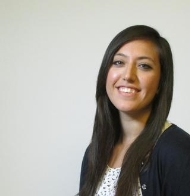
Cynthia Herrera, PharmD, is a hematology/oncology clinical pharmacist practicing at Northwestern Memorial Hospital, Robert H. Lurie Comprehensive Cancer Center in Chicago, Illinois. She completed a post-graduate year 1 residency at Northwestern Memorial Hospital, and she completed her oncology post-graduate year 2 residency at the Dana-Farber Cancer Institute in Boston, Massachusetts. Her practice is mainly focused in hematologic malignancies and bone marrow/stem cell transplant.
It can be overwhelming for people with cancer who have either recently been diagnosed or who are undergoing changes in their treatment to navigate an experience with so much ambiguity. People with cancer may not always know how long treatments will last and what side effects may come from it. However, oncology pharmacists can help patients with cancer get a better understanding of the medications they may need to take, as well as help them effectively manage any potential side effects that arise.
What does an oncology pharmacist do?
Working closely alongside oncologists, hematologists, and other clinical colleagues, oncology pharmacists manage medications for people with cancer who are in an outpatient clinic or who are admitted to the hospital. Whether it is at the beginning of the diagnosis, assisting with assessment, or providing guidance on treatment decisions and medication management, there is usually an oncology pharmacist involved in every patient’s oncology care.
When a person is admitted to the hospital where I work, for example, there is a team of inpatient and outpatient clinical oncology pharmacists that are closely monitoring every patient. After a person is diagnosed with cancer, we discuss with our team of doctors, nurses, and other health care providers what will be the best individualized treatment option available for the patient. Once a treatment is planned, oncology pharmacists work behind the scenes with the support of pharmacy technicians to mix and dispense the chemotherapy or biologic drugs and to make sure that the right medication and dose is given.
Oncology pharmacists also assess laboratory tests and organ function to make sure cancer treatments are dosed correctly. Depending on how well a person’s liver, heart, and kidneys are functioning, we might recommend dose adjustments of chemotherapy, for example, because problems with liver and kidney function can affect how the chemotherapy is processed by the body. This also includes providing recommendations on supportive therapies, such as how to treat an infection, working to treat nausea and vomiting, figuring out how to treat pain, what treatment is best for someone who develops a blood clot, and so much more.
Getting support from your oncology pharmacist
The best way to get support from your oncology pharmacist is to simply ask to talk with them. If you don’t directly interact with your oncology pharmacist, your nurse and physician work closely with them and can direct the oncology pharmacist your way if you ask for a visit.
Once you’re with your oncology pharmacist, feel free to ask them any treatment-related questions that you may have. Some of the best questions you can ask your oncology pharmacist include:
-
How does this treatment work to treat my cancer?
-
How long is the treatment for?
-
What side effects are most common with this treatment, and when should I expect them?
-
What can I do to help avoid experiencing any side effects from this treatment?
-
What can I do to help manage any side effects from this treatment?
-
I am taking some herbal supplements. Will they interact with my cancer treatment?
-
Do any of my current medications interact with the new cancer treatment I am starting?
-
Is it safe for me to take my blood thinners while I am on this new cancer treatment?
-
At what point should I contact my primary oncologist regarding any side effects I am experiencing?
-
Does my cancer treatment put me at high risk for any specific types of infections, and am I on any medications to help prevent those infections?
If it is your first time receiving treatment, your oncology pharmacist can come by before administering the medication and talk to you about the new therapy. Information that can be discussed includes:
-
What it will look like to receive the medication
-
How long the therapy will last
-
What side effects you may need to look out for
If you’re starting treatment for the first time, are confused about medications you’re currently on, are changing medications, or if you have questions about the side effects from new or previous treatments, don’t hesitate to reach out to your oncology pharmacist. We’re here to help.
